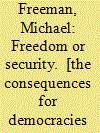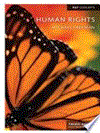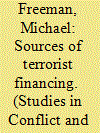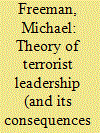| Srl | Item |
| 1 |
ID:
080884


|
|
|
|
|
| Publication |
2008.
|
| Summary/Abstract |
How will the strategy of spreading democracy affect the threat of terrorism from Al Qaeda and likeminded Islamic extremist groups? This article analyzes how spreading democracy would impact four different sets of underlying motivations that lead to this kind of terrorism. It will show that the widespread belief in the power of democracy is likely misplaced because democracy will be unlikely to change perceptions of occupation, will itself threaten Islamic identity and culture, will be unlikely to mitigate economic grievances, and will be unlikely to provide a more legitimate government than one based on religious law.
|
|
|
|
|
|
|
|
|
|
|
|
|
|
|
|
| 2 |
ID:
045936


|
|
|
|
|
| Publication |
London, Praeger, 2003.
|
| Description |
vii, 218p.
|
| Standard Number |
027597913X
|
|
|
|
|
|
|
|
|
|
|
|
Copies: C:1/I:0,R:0,Q:0
Circulation
| Accession# | Call# | Current Location | Status | Policy | Location |
| 046942 | 323.44/FRE 046942 | Main | On Shelf | General | |
|
|
|
|
| 3 |
ID:
153211


|
|
|
|
|
| Edition |
3rd ed.
|
| Publication |
Cambridge, Polity Press, 2017.
|
| Description |
ix, 256p.pbk
|
| Series |
Key Concepts Series
|
| Standard Number |
9781509510283
|
|
|
|
|
|
|
|
|
|
|
|
Copies: C:1/I:0,R:0,Q:0
Circulation
| Accession# | Call# | Current Location | Status | Policy | Location |
| 059107 | 323/FRE 059107 | Main | On Shelf | General | |
|
|
|
|
| 4 |
ID:
106573


|
|
|
|
|
| Publication |
2011.
|
| Summary/Abstract |
Terrorism costs money. Although the costs of specific operations may be relatively inexpensive, terrorist organizations require much larger budgets in order to function. But how do terrorist groups acquire funding? What explains the variation in the particular sources used by different groups? This article develops a theory of terrorist financing that identifies criteria by which we can evaluate the different sources of terrorist funding, particularly in terms of their advantages and disadvantages to the terrorist group. These criteria are then applied across a typology of four primary types of terrorist financing: state sponsorship, illegal activity, legal activity, and popular support.
|
|
|
|
|
|
|
|
|
|
|
|
|
|
|
|
| 5 |
ID:
133543


|
|
|
|
|
| Publication |
2014.
|
| Summary/Abstract |
States often target terrorist leaders with the belief that the leader's death or capture will cause the terrorist organization to collapse. Yet the history of this strategy of "leadership targeting" provides a mixed record-for every example of effectiveness, there are similar examples of ineffectiveness. The central question of this article is: what makes a terrorist leader important? Specifically, what does a terrorist leader do that no one else can do (or do as well) for the organization? To answer this question, I develop a theory of terrorist leadership that argues that leaders might potentially perform two main functions: they can provide inspiration and/or operational direction (or not for both). I also theorize as to how and why the provision of these functions changes over time as the organization itself changes. The consequences for leadership targeting flow naturally from this theory-when leaders provide these functions to the organization, leadership targeting is most likely to be effective. Case studies of Algeria, Peru, and Japan offer insights into why some cases of leadership targeting were effective and why others were not. The conclusion extends this model with an analysis of al-Qaeda's prospects after the death of bin Laden.
|
|
|
|
|
|
|
|
|
|
|
|
|
|
|
|